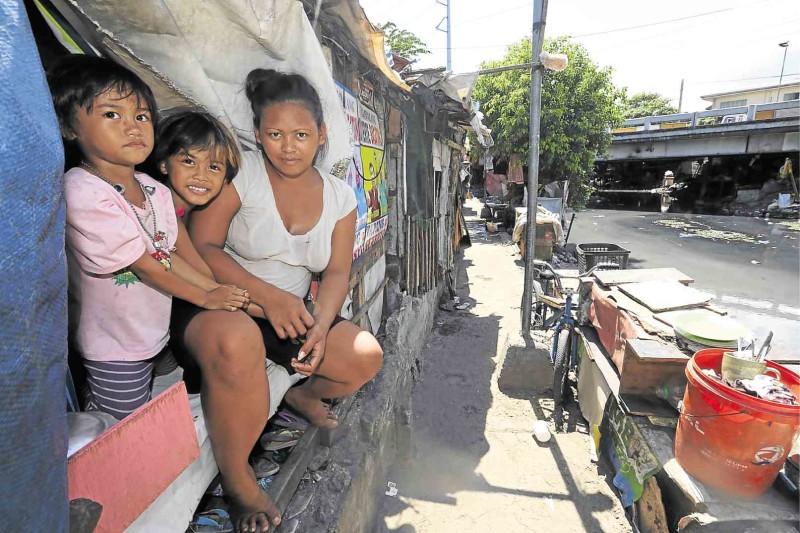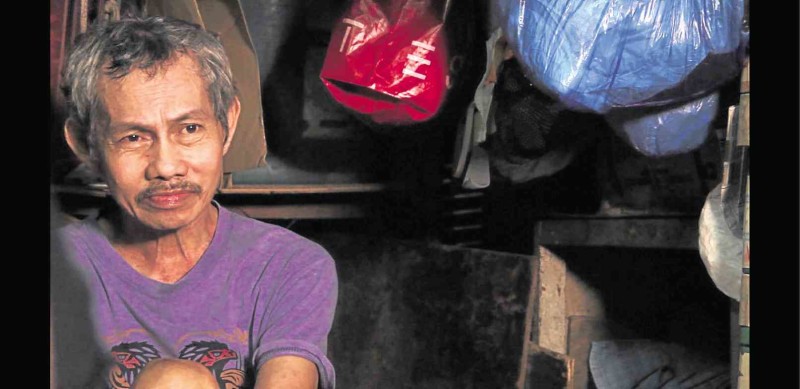Better social security for all

LIVING ON THE EDGE Janet Francisco, 25, with children Melody, 6, and Rose Jane, 7, living near the Paco-Pandacan Bridge in Manila. They used to live under the bridge. RAFFY LERMA
JANET Francisco of Paco, Manila, wanted to go back to school but at 25 has her hands full.
Her five little children, staying in their shack beside the Paco-Pandacan Bridge, were more than enough to keep Janet busy.
Article continues after this advertisement“It was my dream to finish school and help mother until her old age,” said Janet, who confessed to dreaming of becoming a surgeon. “But I no longer have the will to resume my studies as I have to take care of my children.”
Like Janet who dreams of living a decent life, Oscar Imperial, who is from the same informal settler community by the bridge, desires to get out of his predicament. The senior citizen is suffering from a debilitating disease for 10 years now. His wife Judith, a laundrywoman, can’t afford his medicines. “Lord, please help us,” Oscar said. “If I die, I entrust to you my family.”
Hope
Article continues after this advertisementThere is hope for a better life. A proposal, dubbed “Project Serendipity,” seeks to set up a “Sovereign Fund” to be set aside through automatic annual segregation and reservation of 20 percent of the country’s wealth and resources for better social security and welfare cover for all.
Project Serendipity is now being pushed in Sorsogon province and subsequently in the whole Bicol region and the rest of the country.
Bishop Bastes
Led by Bishop Arturo M. Bastes, SVD, DD, of the Diocese of Sorsogon, the project is aimed at helping empower Filipinos by giving them access to resources, services and opportunities, and by enabling them to be productive nation builders so they can better secure a more decent life.
“To focus attention on the poor means to do something concrete for the poor,” Bastes said in an address to fellow bishops at the 112th Plenary of the Catholic Bishops’ Conference of the Philippines (CBCP) On Jan. 22-24.
He lamented the widespread poverty and the deteriorating quality of life caused by self-serving and corrupt public servants.
“Who among us look around and do not see the poor?” asked the bishop. He urged every Filipino to hear the cry of the poor, protect them and promote their liberation so that they can live better lives, with dignity and deserving of the name human.
“Our struggle to build the Kingdom of God is a pilgrim journey. It is a journey toward truth, justice, love and peace, integrity of creation, and a journey to fullness of life. Indeed, it is a journey to total human liberation,” he said. As Christians, Filipinos have to live their faith and manifest this faith through care for the needy.
Pastoral letter
His speech came after his issuance of a pastoral letter on Oct. 15, 2015, exhorting the diocesan faithful to focus on the plight of the marginalized in line with the CBCP declaration of the past year as the Year of the Poor.
Citing the 2nd Plenary Council of the Philippines’ stand on the need for social transformation, Bastes also recalled the visit of Pope Francis on Jan. 15-19 last year. “Pope Francis admonished our country’s leaders to stop corruption and pay attention to the poor. He asked the government to break the bond of ‘scandalous social inequalities,’ and reform the social structure that causes poverty and the exclusion of the poor.”
The Diocese of Sorsogon has adopted Project Serendipity to address poverty and the need to empower our people.
Poverty index
Lifting people out of poverty is a huge challenge. “(W)hile the Philippine economy has been growing at a rapid pace in the last five years, much still has to be done to achieve even faster poverty reduction and more inclusive growth,” then Economic Planning Secretary Arsenio Balisacan said in a statement at a 2015 year-end briefing.
Poverty incidence among Filipinos in the first semester of 2015 was estimated at 26.3 percent, according to the Philippine Statistics Authority. In the same period in 2012, the poverty incidence was recorded at 27.9 percent, 24.6 percent in 2013 and 25.8 percent in 2014.
Poor social security
Bastes said this poverty was rooted in government’s insufficient provision and delivery of social security and welfare services for housing, education, health, disability assistance and pension requirements of the people.
As a result, the productive potentials of the vast majority of our people continue to be undeveloped and underutilized, he said.
The bishop added that even as each administration attempted to eradicate poverty, the system of graft negated all these efforts. Failure to satisfy the basic social security and welfare needs of the people spawns social inequalities and social disorder that lead to inherited poverty, he said.
Radical
There has to be a move, Bastes pointed out, a more radical one. Perhaps, to shift the focus of development and the locus of power back to the sovereign people. This will bring us back to the root of the problem—the poor, unproductive and unempowered individual—that will lead us to the solution we have long searched for.
But it is in vain since our solutions have been focused on the empowerment of leaders and on the framework of governance that likewise seeks to empower the rulers even more.
“We looked at the merits of Project Serendipity and we believe this is a God-sent mission. We want this to happen in our country so that every Filipino citizen will be truly empowered to pursue a decent life,” Bastes said.
Integral evangelization
Project Serendipity is aligned with the Church’s mission of integral evangelization that includes the task of social transformation—helping resolve social issues, among them poverty, according to the bishop.
Furthermore, it eliminates the “brick wall” that separates the “haves” and the “have-nots” because the program cuts across all economic strata and benefits everyone regardless of religious, political and professional affiliation.
Protection plans
Equally important is the project’s protection plans for the elderly, the infirm and the helpless. At present, retirement benefits for the elderly are wanting. Many pensioners receive monthly pensions ranging from P1,200 to P5,700, below the poverty threshold.
Those in need of medical attention will have to queue up in public hospitals for treatment because they do not have the funds to go to private hospitals. Worse, they can barely afford to buy medicines.
Many remain homeless. Many children of school age are out of school with no chance of being able to go to school.
Project Serendipity calls for a constitutional amendment, the 20R8 Serendipity Amendment, that provides for the automatic setting aside of 20 percent of all revenues, receipts, receivables, royalties, reserves, resources, recoveries, returns and all that refer to monies, funds, incomes, assets, properties of the government, all its offices, branches and corporations.
The funds are to be exclusively spent not only for social security and welfare requirements of all our people but also for the succeeding generations.
At least P600B
Twenty-percent of the national budget of P3.4 trillion this year and the revenues and income inflows, which include debts, should amount to at least P600 billion.
An example is national government revenues. Revenue is among the eight Rs identified by Project Serendipity from which the 20 percent should be allocated to the Sovereign Fund.
Bureau of Treasury data show that for 2015 the revenues of the national government amounted to P2.108 trillion. Automatic allocation of 20 percent translates to P421.7 billion for the social welfare fund. This is from revenues alone and could still go up once allocation from the other sources are included.
Using P600 billion as the hypothetical amount to be set aside for the Sovereign Fund for 2016, this amount can cover health, education, livelihood, emergency assistance and shelter needs of all Filipinos. While it should be the Supreme Court that shall create and guide the Philippine Sovereign Fund for a Social Security and Welfare Authority, would it not be beneficial if at least P100 billion each is allotted for health, education, livelihood and jobs, pension and shelter?
People’s initiative, ammendment
The 20R8 Serendipity Amendment will be initiated directly by the people through the filing of a petition in the Supreme Court.
Upon acceptance by the Supreme Court of the petition, it shall order the holding of a national plebiscite to enable the people to directly adopt the amendment to their own Constitution.
Independent fund management
The approval of the amendment will pave the way for the establishment of a legal entity, the Social Security, Human Development and Welfare Protection Sovereign Fund, to which the 20 percent that is automatically set aside shall accrue.
The fund will have independence in management and application, features similar to those of the Provident Fund of Singapore and the Sovereign Wealth Fund of Norway.
As conceptualized, Serendipity is “a project of, by, from and for the people to directly, properly, sufficiently, sustainably, independently and institutionally empower themselves through an effective social security, human development and welfare program for all.”
Anchored on HELPS
Bastes said the Serendipity Fund would be used to meet the social security and welfare requirements of Filipinos anchored on HELPS—health, education, livelihood and emergency assistance, pension and shelter.
“Once these needs are satisfied, the people will be truly empowered, productive, confident and committed, vigilant stakeholders in the economic development of the country,” he said.
Aside from providing a world-class social security and welfare cover for all, Project Serendipity will eliminate the people’s dependence on government and politicians’ doles—the best antidote to the politics of patronage.
It is not a band-aid solution like the conditional cash transfer program, which supplies some with a spark of hope that fades in a few days.
Free, just, prosperous
Bastes said the project would prove that all development and progress must start and end with the individual’s empowerment, welfare, interest and well being to enable him or her to be a sovereign citizen and nation-builder, who can be of service to others. An empowered citizen is the most important pillar in the building of a “free, just, virtuous and prosperous” nation.
With Project Serendipity, Janet and Oscar and many others like them now have the hope that issues on health, education, livelihood, pension and shelter are addressed through better social security that covers the welfare of all.
(Rev. Philippe Andrew B. Gallanosa, JCL, MPR, is chair of the Sorsogon Diocese Commission on Media for Evangelization. He is also general manager of Good News Sorsogon Foundation Inc. [dwCB TV11, dzGN 102.3 Spirit FM Sorsogon and Good News Printing Press] as well as spiritual director at Our Lady of Peñafrancia Seminary High School Department.)

















